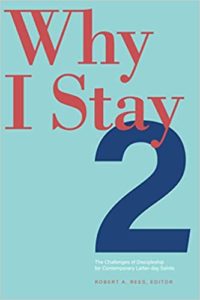 Title: Why I Stay 2: The Challenges of Discipleship for Contemporary Latter-day Saints
Title: Why I Stay 2: The Challenges of Discipleship for Contemporary Latter-day Saints
Editor: Robert Rees
Publisher: Signature Books
Year: 2021
Paperback, 200 pages
(Reviewed by Emily Benedict)
With a world that is becoming increasingly secular, this collection of essays articulates many reasons to continue to congregate in faith. While some essays were very beautifully written and particularly thought-provoking, all contained honest and vulnerable thoughts, experiences, and gems worth pondering. Our initial seedlings of faith and religion begin with our family and culture, but at some point in our faith journey we have to rely on our own impressions and experiences to authentically proceed. So many factors play into this commitment and this book touches on many I can relate to and others that broadened my understanding. Since I recognize how faith and religion have inspired me to be my best self, and also the importance of surrounding myself with people who are trying to be Christlike as well, I am not sure that I was the target audience for this book (I’m guessing it was meant for people who are going through a faith crisis and deciding whether or not to stay). Nevertheless, the thoughts and experiences shared strengthened my resolve and commitment. Lastly, although this was written by members of the Church of Jesus Christ of Latter-day Saints, I think many of the principles and thoughts can be applied more generally to other religions.
The essays I most connected with:
-“Questing and Questioning” – Philip L. Barlow
-“Circles of Light” – Susan Hinckley
-“Where God Is: A Widening View” – Carol Lynn Pearson
-“Staying Takes Work” – Mitch Mayne
-“Walking One Another Home” – Robert A. Rees
-Carol Lynn Pearson stays for the main two reasons “I find a great deal of love in this church,” and “where I do not find love, I have an opportunity to help create love.”
-“It is an act of love by God to the truths themselves to allow, even encourage, deep, soulful commitment to very particular truths while at the same time making it possible for us, as we grow spiritually, to glean from other faiths truths that complement and expand our own.” –Dan Wotherspoon
-“Over the years, I have become more content with ‘believing’ or even ‘hoping’ than with ‘knowing.’ The Givenses write further that ‘the call to faith is a summons to engage the heart, to attune it to resonate in sympathy with principles and values and ideals that we devoutly hope are true, and that we have reasonable but not certain grounds for believing to be true. And that what we choose to embrace, to be responsive to, is the purest reflection of what we love.” –Curt Bench
-“I know being part of such a community can be challenging, I also see my ward community as providing a way for me to learn and grow precisely because it encourages me to learn to understand the perspectives of others. Being part of a ward helps me become less rigid and judgmental in my perspectives because I am challenged to look beyond people’s ideology and personalities and into their hearts.” –Ronda Roberts-Callister
-“By recognizing and placing my faith in the Savior—where it rightly belongs—I have allowed myself to let go of many unrealistic expectations I once had of my religion.” –Robert Rees
-“Even those who believe in revelation, we humans at best ‘see through a glass darkly.’ We do not have access to ultimate reality; instead we may choose to trust in it. The Hebrew word commonly translate as ‘to know’ in the Bible carries the sense not merely of ‘to apprehend,’ but also ‘to encounter.’ When I ‘know’ in the context of faith, I refer not merely to an intellectual act or personal inspiration; I speak of my experience…good doctrine ‘tastes’ good…Hence spiritual ‘knowing’ is not a monolithic process and what is meant by ‘knowing’ requires some thought and experience.” -Philip L. Barlow
-“Why do I stay? Because I want to be a light much bigger and brighter than I am now, and I feel it could happen if I’m willing to keep showing up with the wounded and weary and disenfranchised every Sunday, each of us a little less alone when we recognize something true in the other, standing together in a circle of collective light we draw for ourselves and anyone who needs it.” -Susan Hinckley
-The purpose of church: “To make it possible for each of us, in communion and in community, to experience the love of God and the love of others in deep, intimate ways and, therefore, to feel enough love for ourselves that we can allow the grace of God to work its miracle in our lives.” –Robert Rees
-“Christian Wiman adds, ‘At some point you have to believe that the inadequacies of the words you use will be transcended by the faith with which you use them.’ That is, we must use language to describe and testify of our faith, but faith is something that lies beyond language, something transcendent, and, ultimately, holy.” –Robert Rees
-Take ownership of your beliefs and spiritual wellbeing, put your faith in Christ and not a church, work to develop a deep and personal relationship with the Savior, be an active seeker, evaluate if your belief is helping you to be a better person
